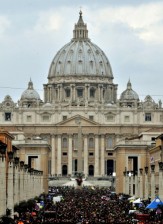
AFP FILE PHOTO
VATICAN CITY — Cardinals from around the globe will hold a conclave to elect a new leader of the world’s 1.2 billion Catholics next week, the Vatican said, although the exact date will be set later on Friday.
Vatican spokesman Federico Lombardi said a meeting of cardinals that ends at 1800 GMT would take a vote on the date for the start of the conclave.
“The conclave will be next week. It could be Wednesday. Monday, Tuesday, Wednesday, maybe even Thursday,” Lombardi said at a press briefing.
The Vatican said all 115 “cardinal electors” who will vote in the conclave are now in Rome.
The last elector, Vietnam’s Jean-Baptiste Pham Minh Man, arrived on Thursday and like his colleagues swore a solemn oath not to divulge the content of pre-conclave talks between cardinals.
At a meeting Friday, the cardinals formally voted to accept the reasons given by two electors for absenting themselves from the conclave: Indonesian Cardinal Julius Darmaatjadja is ill, while British Cardinal Keith O’Brien withdrew after admitting “inappropriate acts” with priests.
In the run-up to the conclave, the Princes of the Church have seized the rare chance of being able to air their grievances against the Vatican, with no new pope to defer to and no old pope to mourn.
Benedict XVI suddenly announced his resignation last month saying he was too old to keep up with a fast-changing modern world, an unprecedented decision in modern Catholic history that has sent shockwaves through the Church worldwide.
The meetings of elderly cardinals that began on Monday are normally something of a formality before the conclave to elect a new pope but this time around they have taken a revolutionary turn.
The closed-door talks are protected by an oath of secrecy, but the voices calling for change have been growing louder after the first papal resignation since the Middle Ages.
Lombardi has said that the issue of the Roman Curia — the administration of the Catholic Church — and its interaction with the Church has been brought up frequently in the meetings.
German cardinal Walter Kasper has been perhaps the most outspoken, telling the Italian daily La Repubblica before a media blackout was imposed that it was time for a “more horizontal government” to shake up the Church hierarchy.
“The Curia must be revolutionized,” Kasper said in the interview, adding: “As well as the word reform, there must be a second: transparency.”
Cardinals like Kasper had called for time for discussions that could effectively set out an agenda for the new pope but media reports said that many Italian cardinals were getting restless.
Vatican watchers suggested the cardinals were split roughly into two groups, between those who think that Italy’s Angelo Scola, the Archbishop of Milan, is the man to tackle the Curia, and those who want a foreign leader to carry out reforms.
Before they abruptly cancelled their daily media briefings on Wednesday, the US cardinals said they were also in favour of broader talks on the Church.
“For some, they want more discussions about these issues. There may be some who are a little more impatient,” Daniel DiNardo, the archbishop of Galveston-Houston in Texas, told reporters.
“I think that we need to look attentively at the work of the Curia in recent years,” DiNardo said, calling for more efficiency in Vatican government.
Sean O’Malley, the archbishop of Boston who is seen as a possible candidate for pope, said: “There is definitely a lot of reflection going on in the Catholic world on the governance of the Catholic Church and how to improve it.”
The Curia is the main instrument of Church governance and includes the Secretariat of State, effectively the foreign ministry, as well as an array of pontifical councils and congregations.
While its role has been a subject of often heated debate in the Church for centuries with reformers calling for greater “collegiality”, matters have come to a head with the “Vatileaks” scandal.
Benedict XVI’s butler Paolo Gabriele last year leaked hundreds of confidential Vatican documents to the press in what he said was an effort to bring greater transparency and reveal the corruption and infighting in the Vatican.
Suspicions have lingered that more Vatican insiders were involved and a top-secret report into the Curia compiled by three cardinals for Benedict XVI has been judged so sensitive that it will only be shown to his successor.
Massimo Franco, a columnist for Italy’s top daily Corriere della Sera, said the report was like a “floating mine” around the Sistine Chapel.